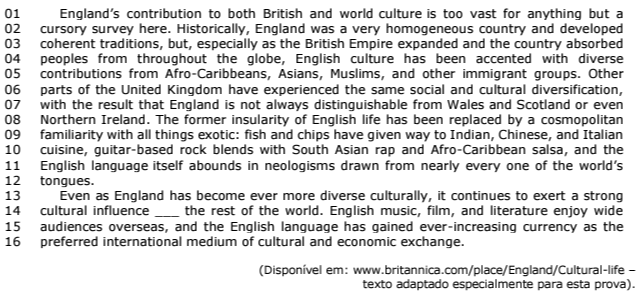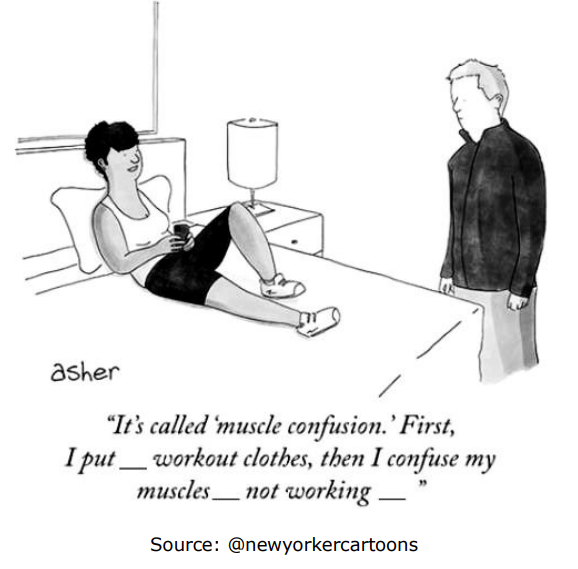Questões de Concurso
Sobre preposições | prepositions em inglês
Foram encontradas 419 questões

Um dos aspectos a ser abordado em aulas de língua inglesa é o do uso de preposições após verbos, substantivos e adjetivos. Assinale a alternativa que preenche corretamente a lacuna da linha 14.
Fill out the gaps below with one the following words: that / where / which / who.
1. That’s the store ___ they buy their shoes.
2. The book, ___ we’ve been reading at school, was written long ago.
3. These are the directors and movies ___ I like.
4. Marie Curie is the woman ___ discovered radium.
Mark the alternative that fills out, correctly and respectively, the gaps in the sentences above.

Mark the alternative that fills out, correctly and respectively, the gaps in the sentences above.
• Can you come __ Monday? • She's __ Korea for the holidays. • They can't work __ night this week. • I hate it when people are too excited early __ the morning.
Mark the alternative that fills out, correctly and respectively, the gaps in the sentences above.
La Mer lip balm is touted __ many celebs as a bit of a handbag necessity. But according to Mia, nothing beats a pot of good-old Vaseline. And while La Mer balm can set you back £58 ($75), Vaseline can be as cheap as a couple of pounds.
(_) The children are tired of going to the same place every summer. (_) She spoke for hours without use notes. (_) Thank you for coming.
Julgue o item subsequente.
Julgue o item subsequente.
“With the rapid development _____ modern technology, the space _____ information confrontation is no longer limited _____ land, sea, and the low altitude. Near space has also become a new battlefield _____ modern warfare and an important part of the national security system,”
“China has paid close attention _____ other countries’ developments _____ this region, which has been hailed _____ Chinese military experts _____ “a new front for militarization” and “an important field of competition among the world’s military powers.”.”
Leia o texto para responder a questão.
English as a Lingua Franca
A number of researchers have studied conversations in English as a Lingua Franca and have noted a number of somewhat surprising characteristics, including:
• Non-use of third person present simple tense -s (She look very sad).
• Interchangeable use of the relative pronouns who and which (a book who, a boy which).
• Omission of articles where they are mandatory in native-speaker English.
• Increasing of redundancy by adding “inexistent” prepositions (We have to study about…, The article treats of…).
• Pluralisation of nouns which are considered uncountable in native-speaker English (informations, staffs).
The evidence suggests that non-native speakers are not conforming to a native English standard. Indeed they seem to get along perfectly well despite the fact that they miss things out and put things in which they ‘should not do’. Not only this, but they are actually better at ‘accommodating’ - that is, negotiating shared meaning through helping each other in a more cooperative way - than, it is suggested, native speakers are when talking to second language speakers (Jenkins 2004). In other words, non-native speakers seem to be better at ELF communication than native speakers are.
(Jeremy Harmer, The practice of English language teaching. Adaptado)
